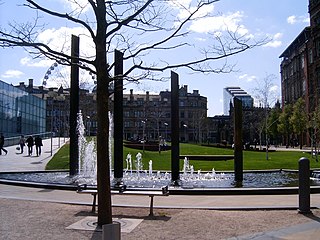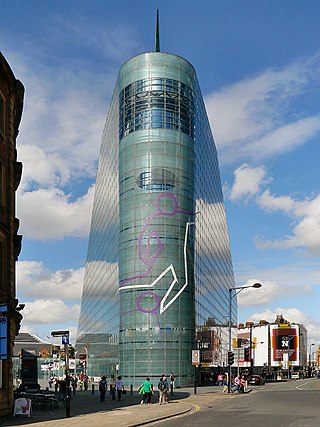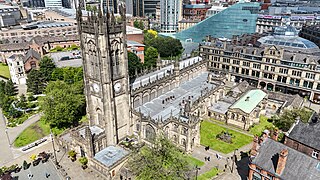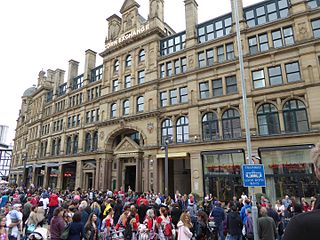52 Sights in Manchester, United Kingdom (with Map and Images)
Legend
Premium Sights
Book tickets, guided tours and activities in Manchester.
Guided Free Walking Tours
Book free guided walking tours in Manchester.
Welcome to your journey through the most beautiful sights in Manchester, United Kingdom! Whether you want to discover the city's historical treasures or experience its modern highlights, you'll find everything your heart desires here. Be inspired by our selection and plan your unforgettable adventure in Manchester. Dive into the diversity of this fascinating city and discover everything it has to offer.
Sightseeing Tours in ManchesterActivities in ManchesterManchester Art Gallery, formerly Manchester City Art Gallery, is a publicly owned art museum on Mosley Street in Manchester city centre, England. The main gallery premises were built for a learned society in 1823 and today its collection occupies three connected buildings, two of which were designed by Sir Charles Barry. Both of Barry's buildings are listed. The building that links them was designed by Hopkins Architects following an architectural design competition managed by RIBA Competitions. It opened in 2002 following a major renovation and expansion project undertaken by the art gallery.
Contact is an arts organisation based in Manchester, England. Established in 1972, as a center for young artists to create and learn, the theatre remains in its original building and is a part of the Arts Council England, the University of Manchester, the Manchester City Council, and the Association of Greater Manchester Authorities..
The National Football Museum is England's national museum of football. It is based in the Urbis building in Manchester city centre, and preserves, conserves and displays important collections of football memorabilia.
Manchester Cathedral, formally the Cathedral and Collegiate Church of St Mary, St Denys and St George, in Manchester, England, is the mother church of the Anglican Diocese of Manchester, seat of the Bishop of Manchester and the city's parish church. It is on Victoria Street in Manchester city centre and is a grade I listed building.
Wikipedia: Manchester Cathedral (EN), Website, Heritage Website
The Palace Theatre is one of the main theatres in Manchester, England. It is situated on Oxford Street, on the north-east corner of the intersection with Whitworth Street. The Palace and its sister theatre the Opera House on Quay Street are operated by the same parent company, Ambassador Theatre Group. The original capacity of 3,675 has been reduced to its current 1,955.
St Michael's Flags and Angel Meadow Park is a public park in Manchester, England, to the immediate northeast of the city centre, on a slope between the River Irk and Rochdale Road. It occupies an area of 7.4 acres (3 ha), and was once an affluent suburb, until the 19th-century Industrial Revolution altered the social standing of the area and introduced poverty and disease. Regeneration of the park in the 2000s has created a gateway into the Irk Valley.

Sackville Gardens is a public space in Manchester, England. It is bounded by Manchester College's Shena Simon Campus on one side and Whitworth Street, Sackville Street, the Rochdale Canal and Canal Street on the others.
8. AO Arena
Manchester Arena is an indoor arena in Manchester, England, immediately north of the city centre and partly above Manchester Victoria station in air rights space. Prior to the opening of Co-op Live, the arena had the highest seating capacity of any indoor venue in the United Kingdom, and is the third-largest in Europe with a capacity of 21,000.
9. Hulme Hippodrome
The Hulme Hippodrome in Manchester, England, is a shuttered Grade II listed building, a proscenium arch theatre with two galleries and a side hall. It was originally known as the Grand Junction Theatre and Floral Hall, and opened on 7 October 1901 on the former main road of Preston Street, Hulme, and stage access is from Warwick Street. The Hulme Hippodrome theatre is located in the same building and shares a party wall with its small sibling theatre, The Playhouse. The Hippodrome was a music hall and variety theatre, a repertory theatre in the 1940s, and hired on Sundays for recording BBC programmes with live audiences between 1950 and 1956. In the 1960s and 1970s it was a bingo hall, and from 2003 used by a disgraced church. The theatre has been closed since 2018 and a campaign group exists to bring it back into use as a community resource, where the current owner is seeking permission to build apartments. Its local name in memoirs and records is 'Hulme Hipp'. Its national heritage significance includes being the venue for live recording the first three series of BBC programmes by Morecambe and Wise comedians.
10. Heaton Park

Heaton Park is a public park in Manchester, England, covering an area of over 600 acres (242.8 ha). The park includes the grounds of a Grade I listed, neoclassical 18th century country house, Heaton Hall. The hall, remodelled by James Wyatt in 1772, is now only open to the public on an occasional basis as a museum and events venue. It is the biggest park in Greater Manchester, and also the largest municipal park in Europe.
11. Cenotaph
Manchester Cenotaph is a war memorial in St Peter's Square, Manchester, England. Manchester was late in commissioning a First World War memorial compared with most British towns and cities; the city council did not convene a war memorial committee until 1922. The committee quickly achieved its target of raising £10,000 but finding a suitable location for the monument proved controversial. The preferred site in Albert Square would have required the removal and relocation of other statues and monuments, and was opposed by the city's artistic bodies. The next choice was Piccadilly Gardens, an area already identified for a possible art gallery and library; but in the interests of speedier delivery, the memorial committee settled on St Peter's Square. The area within the square had been purchased by the City Council in 1906, having been the site of the former St Peter's Church; whose sealed burial crypts remained with burials untouched and marked above ground by a memorial stone cross. Negotiations to remove these stalled so the construction of the cenotaph proceeded with the cross and burials in situ.
12. The Manchester Museum
Manchester Museum is a museum displaying works of archaeology, anthropology and natural history and is owned by the University of Manchester, in England. Sited on Oxford Road (A34) at the heart of the university's group of neo-Gothic buildings, it provides access to about 4.5 million items from every continent. It is the UK’s largest university museum and serves both as a major visitor attraction and as a resource for academic research and teaching. It has around 430,000 visitors each year.
13. The Holy Name Catholic Church
The Church of the Holy Name of Jesus on Oxford Road, Manchester, England was designed by Joseph A. Hansom and built between 1869 and 1871. The tower, designed by Adrian Gilbert Scott, was erected in 1928 in memory of Fr Bernard Vaughan, SJ. The church has been Grade I listed on the National Heritage List for England since 1989, having previously been Grade II* listed since 1963.
Wikipedia: Church of the Holy Name of Jesus, Manchester (EN)
14. Science and Industry Museum
The Science and Industry Museum in Manchester, England, traces the development of science, technology and industry with emphasis on the city's achievements in these fields. The museum is part of the Science Museum Group, a non-departmental public body of the Department for Digital, Culture, Media and Sport, having merged with the National Science Museum in 2012.
15. Mamucium
Mamucium, also known as Mancunium, is a former Roman fort in the Castlefield area of Manchester in North West England. The castrum, which was founded c. AD 79 within the Roman province of Roman Britain, was garrisoned by a cohort of Roman auxiliaries near two major Roman roads running through the area. Several sizeable civilian settlements containing soldiers' families, merchants and industry developed outside the fort. The area is a protected Scheduled Ancient Monument.
16. Manchester Islamic Centre & Didsbury Mosque
Didsbury Mosque is on Burton Road in West Didsbury, Manchester, England. The building was originally Albert Park Methodist Chapel, which opened in 1883, but closed in 1962 and was later converted into a mosque. It has an attendance of around 1,000 people. The mosque Sheikh is Mustafa Abdullah Graf.
17. Bridgewater Hall
The Bridgewater Hall is a concert venue in Manchester city centre, England. It cost around £42 million to build in the 1990s, and hosts over 250 performances a year. It is home to the 165-year-old Hallé Orchestra as well as to the Hallé Choir and Hallé Youth Orchestra and it serves as the main concert venue for the BBC Philharmonic.
18. St. Ann's Church

St Ann's Church is a Church of England parish church in Manchester, England. Although named after St Anne, it also pays tribute to the patron of the church, Ann, Lady Bland. St Ann's Church is a Grade I listed building.
19. Cathedral of St John the Evangelist
The Cathedral Church of St. John the Evangelist, usually known as Salford Cathedral, is a Catholic cathedral on Chapel Street in Salford, Greater Manchester, England. It is the seat of the Bishop of Salford and mother church of the Diocese of Salford, and is a Grade II* listed building.
20. Corn Exchange
The Corn Exchange, Manchester is a food court and former shopping centre in Exchange Square, Manchester, England. The building was originally used as a corn exchange and was previously named the Corn & Produce Exchange, and subsequently The Triangle. Following an IRA bomb attack on central Manchester in 1996, it was renovated and was a modern shopping centre until 2014. The building was sold to investors and has been re-developed into a number of food outlets. It is a grade II listed building.
21. Manchester Opera House
The Opera House in Quay Street, Manchester, England, is a 1,920-seater commercial touring theatre that plays host to touring musicals, ballet, concerts and a Christmas pantomime. It is a Grade II listed building. The Opera House is one of the main theatres in Manchester. The Opera House and its sister theatre the Palace Theatre on Oxford Street are operated by the same parent company, Ambassador Theatre Group.
22. Manchester Central Mosque & Islamic Cultural Centre
Manchester Central Mosque and Islamic Cultural Centre is a mosque in Manchester, England. Sometimes referred to as Jamia Mosque, it is situated in the middle of Victoria Park, Manchester close to the Curry Mile. It plays a key role in Manchester's Muslim community. Imam and Khateeb Hafiz Mueen ud Din Akhtar and Qari Hafiz Javed Akhtar are leaders of the mosque, but left in 2018. Qari Javed also leads taraweeh prayers in Ramadan.
23. Great Northern
The Great Northern Warehouse is the former railway goods warehouse of the Great Northern Railway in Manchester city centre, England, which was refurbished into a leisure complex in 1999. The building is at the junction of Deansgate and Peter Street. It was granted Grade II* listed building status in 1974.
24. St Mary's - The Hidden Gem
The Hidden Gem, officially St Mary's Catholic Church, is a church on Mulberry Street, Manchester, England. The parish dates back to 1794, with devotion to St Mary, Our Lady of the Assumption, and the present church, rebuilt in 1848, is a Grade II*-listed building which includes the Diocesan Shrine of Our Lady of Manchester.
25. Albert Memorial
Albert Square is a public square in the centre of Manchester, England. It is dominated by its largest building, the Grade I listed Manchester Town Hall, a Victorian Gothic building by Alfred Waterhouse. Other smaller buildings from the same period surround it, many of which are listed.
26. Victoria Baths

Victoria Baths is a Grade II* listed building, in the Chorlton-on-Medlock area of Manchester, England. The baths opened to the public in 1906 and cost £59,144 to build. Manchester City Council closed the baths in 1993 and the building was left empty. A multimillion-pound restoration project began in 2007. As of 2024, the building is on English Heritage's Heritage at Risk Register.
27. Heaton Park Hebrew Congregation Synagogue
Heaton Park Hebrew Congregation is an Orthodox Jewish congregation and synagogue, located on Middleton Road, Higher Crumpsall, North Manchester, England, in the United Kingdom. The congregation was founded in 1935 and worships in the Ashkenazi rite.
28. Jamia Mosque
North Manchester Jamia Mosque is a mosque in the Cheetham Hill area of Manchester, run under the headship of Qamaruzzaman Azmi by the Ibadur-Rahman Trust. It is one of the largest Muslim centres in Europe.
29. Manchester Jewish Museum
The Manchester Jewish Museum is a Jewish history museum, located on 190 Cheetham Hill Road in Manchester, England, in the United Kingdom. The museum occupies the site of a former Orthodox Jewish synagogue, the place of worship for the Congregation of Spanish & Portuguese Jews, called the Spanish & Portuguese Synagogue, also the Sha'are Tephillah Synagogue. The congregation worships in the Sephardic rite from premises located at 18 Moor Lane, Kersal, Salford.
30. Clayton Hall
Clayton Hall is a 15th-century manor house on Ashton New Road in Clayton, Manchester, England, hidden behind trees in a small park. The hall is a Grade II* listed building, the mound on which it is built is a scheduled ancient monument, and a rare example of a medieval moated site. The hall is surrounded by a moat, making an island 66 by 74 metres. Alterations were made to the hall in the 16th and 17th centuries, and it was enlarged in the 18th century.
31. DC Stephen Oake memorial

DC Stephen Robin Oake, was a police officer serving as an anti-terrorism detective with Greater Manchester Police in the United Kingdom who was murdered while attempting to arrest a suspected terrorist in Manchester on 14 January 2003.
32. St Clement's
St Clement's Church is an active Anglican parish church in Chorlton-cum-Hardy, Manchester, England. Its daughter church, St Barnabas, serves the Barlow Moor estate and south Chorlton. St Clement's is in the Hulme deanery in the diocese of Manchester.
33. Alexandra Park
Alexandra Park is a 60-acre (24 ha) park in Manchester, England, designed by Alexander Gordon Hennell, and opened to the public in 1870. The lodge and gateways are the work of Alfred Darbyshire. The park was developed by Manchester Corporation before the area was incorporated into the city, the site being purchased in 1864 from William Egerton, 1st Baron Egerton. The roads to the East and West sides of the park were named Princess Road and Alexandra Road, also in honour of Princess Alexandra.
34. St Nicholas
The Church of St Nicholas, Kingsway, Burnage, Manchester, is a Modernist church of 1930–2 by N. F. Cachemaille-Day, Lander and Welch. It was enlarged in 1964 with a bay on the west side, also by Cachemaille-Day. Pevsner describes the church as "a milestone in the history of church architecture in England". The church was designated a Grade II* listed building on 10 October 1980.
35. Whitworth Park
Whitworth Park is a public park in south Manchester, England, and the location of the Whitworth Art Gallery. To the north are the University of Manchester's student residences known as "Toblerones". It was historically in Chorlton on Medlock but is now included in the Moss Side ward.
36. Cross Street Chapel
Cross Street Chapel is a Unitarian church in central Manchester, England. It is a member of the General Assembly of Unitarian and Free Christian Churches, the umbrella organisation for British Unitarians.
37. Edgar Wood Centre
The Edgar Wood Centre is a former Church of Christ, Scientist building in Victoria Park, Manchester, England. The church was designed by Edgar Wood in 1903. Nikolaus Pevsner considered it "the only religious building in Lancashire that would be indispensable in a survey of twentieth century church design in all England". It is a Grade I listed building and has been on the Heritage at Risk Register published by Historic England.
38. Manchester Oratory
The Oratory Church of Saint Chad's, Manchester is a Grade II listed Catholic church in Cheetham Hill, Manchester, England. It was constructed between 1846 and 1847, on the east side of Cheetham Hill Road. The parish functions under the jurisdiction of the Roman Catholic Diocese of Salford.
39. The Old Wellington Inn
The Old Wellington Inn is a half-timbered pub in Manchester city centre, England. It is part of Shambles Square, which was created in 1999, and is near Manchester Cathedral. It is a Grade II listed building.
40. Rise up, Women
Rise up, Women, also known as Our Emmeline, is a bronze sculpture of Emmeline Pankhurst in St Peter's Square, Manchester. Pankhurst was a British political activist and leader of the suffragette movement in the United Kingdom. Hazel Reeves sculpted the figure and designed the Meeting Circle that surrounds it.
41. Cathedral Gardens

Cathedral Gardens is an open space in Manchester city centre, in North West England. It is bounded by Victoria railway station to the north, Chetham's School of Music to the west, the perimeter of Manchester Cathedral and the Corn Exchange on Fennel Street to the south and Urbis to the east.
42. Boggart Hole Clough
Boggart Hole Clough is a large woodland and urban country park in Blackley, a suburb of Manchester, England. It occupies an area of approximately 76 hectares, part of an ancient woodland, with picturesque cloughs varying from steep ravines to sloping gullies. Clough is a local dialect word for a steep sided, wooded valley. Boggart Hole Clough was designated a Local Nature Reserve in 2008.
43. Brookfield Church
Brookfield Unitarian Church, Gorton, Manchester, England is a Victorian Gothic church. It is a member of the General Assembly of Unitarian and Free Christian Churches, the umbrella body for British Unitarians.
44. River Irwell Railway Bridge
The River Irwell Railway Bridge was built for the Liverpool & Manchester Railway (L&MR), the world's first passenger railway which used only steam locomotives and operated as a scheduled service, near Water Street in Manchester, England. The stone railway bridge, built in 1830 by George Stephenson, was part of Liverpool Road railway station. The bridge was designated a Grade I listed building on 19 June 1988.
45. St Michael & All Angels
The Church of St Michael and All Angels, Orton Road, Lawton Moor, Northenden, Manchester, is an Anglican church of 1935-7 by N. F.Cachemaille-Day. Pevsner describes the church as "sensational for its country and its time". The church has been listed Grade II* on the National Heritage List for England since 16 January 1981.
Wikipedia: Church of St Michael and All Angels, Northenden (EN)
46. Highfield Country Park

Highfield Country Park is a 70-acre (280,000 m2) area of open land, situated on the east side of Levenshulme, Manchester, that stretches to the east of Broom Avenue across to the rear of Reddish Golf Course and to the junction of Longford Road, Reddish and Nelstrop Road, Levenshulme.
47. Darul Amaan Mosque
The Darul Amaan Mosque is a purpose-built mosque in Manchester, England. Located in Hulme, immediately south of Manchester city centre, the mosque is only a walking distance from the University of Manchester's South Campus. The mosque was built in 2012, at a cost of over £1 million.
48. Saint James' Church
St James' Church is in Great Cheetham Street East, Broughton, Greater Manchester, England. It is an active Anglican parish church, in the deanery of Salford, the archdeaconry of Salford, and the diocese of Manchester. Its benefice has been combined with those of St John the Evangelist, Broughton, and St Clement with St Matthias, Lower Broughton.
49. The Glade of Light

The Glade of Light is a memorial in Manchester, England, that commemorates the victims of the Manchester Arena bombing of 2017. It opened to the public on 5 January 2022 and an official opening event took place 10 May 2022. The memorial is in the form of a garden with a stone centrepiece inscribed with the names of the 22 victims. Individual 'memory capsules' commemorating each victim have been included in the memorial and are situated within the stone centrepiece.
50. Ardwick Green
Ardwick Green is a public space in Ardwick, Manchester, England. It began as a private park for the residents of houses surrounding it before Manchester acquired it in 1867 and turned it into a public park with an ornamental pond and a bandstand.
51. Victory over Blindness

Victory Over Blindness is a bronze sculpture in Manchester, England, by Johanna Domke-Guyot. It is on Piccadilly Approach outside the main entrance of Manchester Piccadilly station and was commissioned to commemorate the centenary of the First World War.
52. Mayfield Park
Mayfield Park is a public park in Manchester city centre, England, covering an area of 6.5 acres (2.6 ha). The city centre's first new public park in more than 100 years, it was officially opened on 22 September 2022 by Bev Craig, the Leader of Manchester City Council.
Share
How likely are you to recommend us?
Disclaimer Please be aware of your surroundings and do not enter private property. We are not liable for any damages that occur during the tours.










































